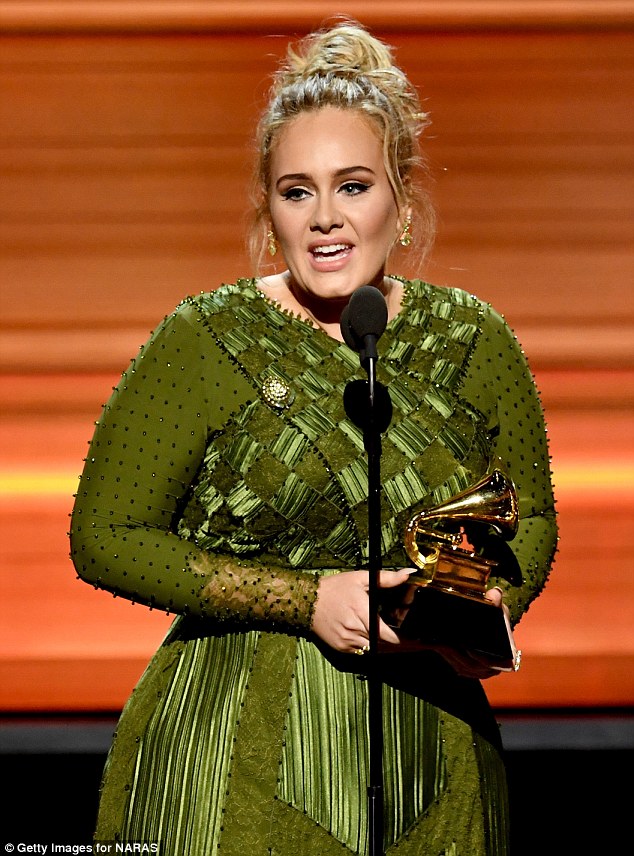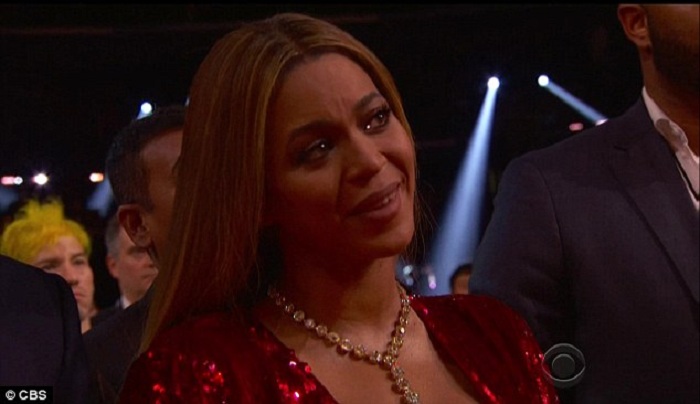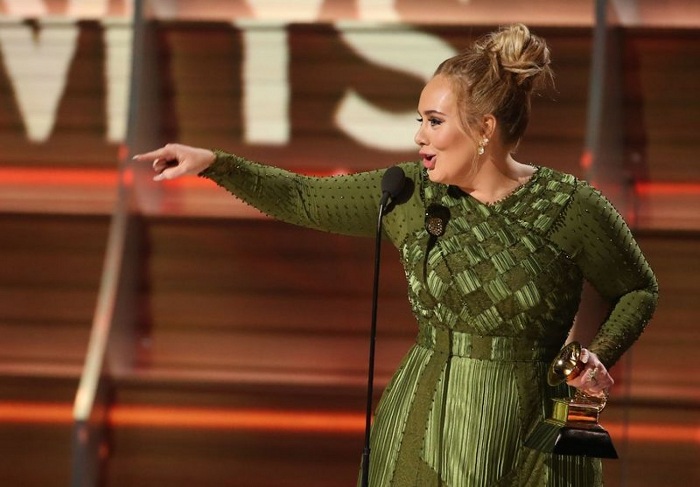Sound familiar? Last year’s Grammy telecast staged an oddly similar showdown between Taylor Swift’s “1989,” a radio-dominating sales juggernaut, and Kendrick Lamar’s “To Pimp A Butterfly,” the unofficial score to the Black Lives Matter movement. After decades of sustained tone-deafness to the vitality of rap and R&B, the Recording Academy had an opportunity to get behind a timely and tenacious album, but it was Swift who went home with the album of the year trophy tucked beneath her arm.

This year, Adele brought her broom. “25” won album of the year, and her heart-squeezing ballad, “Hello,” ended up besting Beyoncé’s commanding “Formation” for song and record of the year. Having swept every category she was nominated in back in 2012, the British balladeer pulled off a repeat Sunday, also winning best pop solo performance and best pop vocal album earlier in the night.
Accepting her statuary for album of the year at the close of the show, the 28-year-old singer tearfully deferred to Beyoncé.

“The ‘Lemonade’ album was so monumental, and so well thought-out, and so beautiful, and soul-baring,” Adele said. “You are our light.”
Beyoncé didn’t go home empty-handed. Accepting the award for best urban contemporary album, the expectant mother of twins spoke about the intent and impact of “Lemonade.”
“We all experience pain and loss and often we become inaudible,” she said. “My intention for the film and album was to create a body of work that will give a voice to our pain, our struggles, our darkness and our history, to confront issues that make us uncomfortable.”
Her brow still appeared a little damp from the performance she’d given moments before — something resembling a sci-fi fertility ritual. It was certainly the most thrilling performance given by a pregnant woman since M.I.A. romped through “Swagga Like Us” at the 2009 Grammys.
Chance the Rapper took home another one of the night’s big genre-blind awards near the top of the show, besting bro-pop duo the Chainsmokers, rapper-singer Anderson .Paak, and country phenoms Maren Morris and Kelsea Ballerini for best new artist. (And never mind that Chance’s breakout album, “Acid Rap,” landed all the way back in 2013 — he’s new enough to the greater Grammy electorate.)
“Independence means freedom,” Chance declared in his best new artist acceptance speech, burnishing his image as an independent artist, even though his latest album, “Coloring Book,” was initially blasted out into the universe via Apple Music.
And while this exuberant Chicago native makes vivacious and deserving music, his good fortune may have been the result of a savvy charm offensive. After dropping “Coloring Book” as a streaming-only release, Chance enthusiastically lobbied the Recording Academy to consider streaming exclusives to be eligible for Grammy nomination. It worked out better than he could have expected. Later in the show, “Coloring Book” won best rap album, and to top things off, Chance delivered an exultant, gospel-soaked performance of “How Great” and “All We Got.”
But even if the academy is finally showing a little flexibility in how it allocates prestige across genres and formats, the telecast’s producers seemed determined to restage the same show we’ve seen in recent years, packing it with ill-fitting collaborations that the show’s producers have proudly branded as “Grammy moments.”
Fresh off her solo performance at last weekend’s Super Bowl halftime show, Lady Gaga joined Metallica for a performance riddled with technical difficulties. Ballerini and Danish pop group Lukas Graham were forced to smoosh their respective hits — “Peter Pan” and “7 Years” — into one nonsensical ballad. And when hitmaker Demi Lovato, country group Little Big Town, R&B singer Andra Day and pop striver Tori Kelly teamed up for a 40th-anniversary tribute to the “Saturday Night Fever” soundtrack, the only thing the four acts appeared to have in common was their Sunday night availability.
There were some gorgeous ballads (Alicia Keys and Maren Morris teamed up for the latter’s “Once”) and some rough ones (Adele began singing “Fastlove” in tribute to George Michael, landed in the wrong key, had to start over, and ended the song in disappointed tears). Later in the show, various artists teamed up for an energetic tribute to the late Prince, featuring his proteges, the Time, and Bruno Mars, ghoulishly dressed-up like his royal Purpleness.
Other big names materialized throughout the night with mid-tempo songs. The Weeknd, Katy Perry and rap legends A Tribe Called Quest weren’t up for any of the night’s awards, but their latest recordings will be eligible next year. Why not follow Chance’s lead and get a jump-start on romancing the electorate?
These more up-tempo tracks — especially Tribe’s high-spirited medley, during which longtime collaborator Busta Rhymes shouted a few harsh words at President Trump — made for a much-needed breath of fresh air. Last year’s ballad-heavy Grammys scored a viewership of roughly 25 million, the show’s lowest pull since 2009. So the faster tempos felt purposeful.
Another tactic for keeping viewers plopped on their couches: replacing five-time host LL Cool J with the host of CBS’s “The Late Late Show,” James Corden, best known for singing his lungs sore during his rampantly viral “Carpool Karaoke” sketches.
Mercifully, Corden only hosted one big singalong during the show — a rendition of Neil Diamond’s “Sweet Caroline” with Tim McGraw, Faith Hill, Jennifer Lopez and others — and kept the proceedings moving along with a few good interstitial yuks.
A vast majority of the year’s awards were given out in a pre-telecast ceremony that aired online Sunday afternoon, during which country music outsider Sturgill Simpson didn’t foresee himself snatching the night’s biggest Grammy later in the night. (His sweeping third album, “A Sailor’s Guide To Earth,” was the dark-horse nominee for album of the year, up against “Lemonade,” “25,” Drake’s “Views” and Justin Bieber’s “Purpose.”) Accepting the trophy for best country album during the pre-telecast, Simpson patted himself on the back with a little self-deprecation: “I guess the revolution will not be televised.”
Frank Ocean wouldn’t be televised, either. Last year, the hermitic R&B star sent a new album, “Blonde,” to the tippy-top of the charts, but chose not to submit it for Grammy consideration.
“That institution certainly has nostalgic importance,” Ocean said of the Grammys in a conversation with the New York Times. “It just doesn’t seem to be representing very well for people who come from where I come from, and hold down what I hold down.”
On the day of the Grammys, Ocean took to Tumblr to post a more profane, pointed screed at the telecast’s producers about his refusal to participate. “If you’re up for a discussion about the cultural bias and general nerve damage the show you produce suffers from then I’m all for it,” Ocean wrote. “Have a good night.”
Ocean’s boycott feels like the most pointed rebuke to the Recording Academy in years — and it seems to have triggered a strength-in-numbers ripple effect before he even started typing on Tumblr. Among the other nominees who sat this year’s ceremony out: Kanye West, Drake and Bieber.
For some of the brightest stars in pop music’s firmament, the revolution starts at home.
/The Washington Post/















































